Internationally Combat “IUU” Fishing and Maintain Sustainable Development of Fishery Resources
2015.5 (Issue No. 275)
The issue of illegal, unreported and unregulated (IUU) fishing has attracted considerable attention from the international community recently. According to the information by the Food and Agriculture Organization of the United Nations (FAO), more than 80 percent of the world’s fish species are exploited by the human beings, and some of them are in a state of over-exploitation or depleted in number. Regional fisheries management organizations and relevant countries strive to adopt a variety of conservation management measures, hoping to maintain the sustainable use of fishery resources. However, IUU fishing constantly undermines efforts by the international community, leading to negative effects on food security and environmental protection. In addition, those engaged in IUU fishing often ignore the safety standards of operation in order to evade national monitoring and reduce operating costs, which puts fishing crews, other vessels and ecological environments at risk. Furthermore, its lower operating costs result in an unfair competition for other law-abiding fishermen.
According to the “International Plan of Action to prevent, deter and eliminate Illegal, Unreported and Unregulated fishing (IPOA-IUU)” enacted by the FAO in 2001, the so-called IUU fishing is defined as follows:
(1) Illegal fishing:
Illegal fishing refers to activities conducted by national or foreign vessels in waters under the jurisdiction of a State, without the permission of the State, or in contravention of its laws and regulations; it is conducted by vessels flying the flag of States that are parties to a relevant regional fisheries management organization but operate in contravention of the conservation and management measures adopted by that organization and by which the States are bound, or relevant provisions of the applicable international law; it violates the national laws or international obligations, including those undertaken by cooperating States to relevant regional fisheries management organizations.
(2) Unreported fishing:
Unreported fishing refers to fishing activities which have not been reported, or have been misreported, to the relevant national authority, in contravention of national laws and regulations; the fishing activities undertook in the area of competence of a relevant regional fisheries management organization which have not been reported or have been misreported, in contravention of the reporting procedures of that organization.
(3) Unregulated fishing:
Unregulated fishing refers to fishing activities in the area of application of a relevant regional fisheries management organization that are conducted by vessels without nationality, or by those flying the flag of a State not party to that organization, or by a fishing entity, in a manner that is not consistent with or contravenes the conservation and management measures of that organization; it is in areas or for fish stocks in relation to which there are no applicable conservation or management measures and where such activities are conducted in a manner inconsistent with State responsibilities for the conservation of living marine resources under international law.
The FAO noted that IUU fishing has existed for a long time and is not a new phenomenon. It may occur not only in high seas fisheries but also in coastal States’ Exclusive Economic Zone (EEZ), rivers and inland fisheries. The root cause of IUU fishing is a lack of effective flag State control. After authorizing vessels to fly their flags, some flag States fail to meet their obligations under international law with respect to the supervision and control of these vessels. This lack of supervision and authorization to fish enables such vessels to engage in IUU fishing with impunity.
In order to quickly curb IUU fishing, restore fishery resources back to a healthy state and achieve the goal of sustainable development, the United Nations passes a number of guidelines, plans and measures, hoping to prevent, deter and eliminate IUU fishing as below:
(1) International Plan of Action to prevent, deter and eliminate Illegal, Unreported and Unregulated fishing (IPOA-IUU)
As currently the international instruments dealing with IUU fishing have not taken effect around the world, it is expected that the enactment of IPOA-IUU can urge all countries to draft their own National Plan of Action (NPOA) and show their political will to jointly combat IUU fishing. A large number of fishing countries, such as Belize, South Korea, Ghana, Argentina, Fiji, Australia, Canada, the United States, Chile, Japan and New Zealand, have developed their NPOA-IUU and show their willingness to prevent, deter and eliminate IUU fishing.
Taiwan also developed the “Republic of China (Taiwan) National Plan of Action to Prevent, Deter and Eliminate Illegal, Unreported and Unregulated Fishing” in 2013, echoing the FAO’s IPOA-IUU and showing its determination to combat IUU fishing.
(2) Port State Measure (PSM)
The main reason of how IUU fishing occurs is the failure of flag States to effectively control fishing operations carried out by vessels flying their flags. In order to achieve the goal of IPOA-IUU, hopefully, through the enhancement of Port State Measures (PSM), port States can strictly control IUU fishing vessels. The FAO approved the “Agreement on Port State Measures to Prevent, Deter and Eliminate Illegal, Unreported and Unregulated Fishing” in 2009. PSM are requirements established or interventions undertaken by port States which a foreign fishing vessel must comply with or is subjected to as a condition for use of ports within the port State. PSM typically include requirements related to prior notification of port entry, use of designated ports, restrictions on port entry and landing/transshipment of fish, restrictions on supplies and services, documentation requirements and port inspections, as well as related measures, such as IUU vessel listing, trade-related measures and sanctions. PSM are regarded as an effective tool to fight against IUU fishing.
To help port States to implement PSM, the FAO provides port States with PSM demonstration programs and PSM minimum standards, giving port States appropriate and feasible methods. Moreover, the FAO assists developing countries to build up their capability of implementing PSM. In addition, through the establishment of a database and the information sharing of PSM, the public and private sectors as well as regional fisheries management organizations can coordinate the implementation of PSM, so as to combat IUU fishing together.
(3) The Global Record of Fishing Vessels Refrigerated Transport Vessels and Supply Vessels
As only flag States keep the registration and record of their own fishing vessels, the number of fishing vessel fleets and comprehensive capture data are not available to the international community. It results in IUU catches easily entering the market. The “Global Record of Fishing Vessels Refrigerated Transport Vessels and Supply Vessels” is launched to effectively manage and control fishing vessels, and to improve the transparency of capture behavior and traceability of catches. Unique Vessel Identifier (UVI) can make the existence of IUU fishing vessels and circulation of IUU catches more difficult, thus eliminating related ships to have commercial activities with IUU fishing vessels.
After a fishing vessel gets its UVI, regardless of changing flag, owner, operator or other information, its UVI will not change. This will help trace the operation situation and record of a certain fishing vessel. Recently, most regional fisheries management organizations respond to this issue by approving relevant conservation and management measures, and requesting fishing vessels of contracting parties to acquire the International Maritime Organization (IMO) Number. Unifying the identification of fishing vessels can facilitate the fight against IUU fishing.
(4) Voluntary Guidelines on Flag State Performance
The FAO’s Committee on Fisheries approved the “Voluntary Guidelines on Flag State Performance” in 2014, hoping that flag States can improve their deficiencies and eliminate IUU fishing by voluntarily examining their own fisheries management.
As the failure of flag States to monitor and control over their fishing vessels is considered the main reason for IUU fishing, many fishing vessels circumvent the related management measures from their flag States by conversing nationalities. It undermines the international community’s joint efforts to combat IUU fishing. Therefore, the United Nations hope that all flag States can adopt Monitoring, Control and Surveillance (MCS) measures to ensure their fishing vessels not engaged in IUU fishing. The measures include Vessel Monitoring System (VMS), observer system, etc. In addition, through information exchange and cooperation, all States are encouraged to refuse the registration of IUU fishing vessels and take action on illegal fishing vessels. International cooperation is strengthened to assist developing countries to fulfill their responsibilities as flag States.
The United States passed the “Magnuson-Stevens Fishery Conservation and Management Reauthorization Act (MSRA)” in 2007 that strengthens the U.S. government to take certain measures on States with fishing vessels engaged in IUU fishing. The Act requires the National Oceanic and Atmospheric Administration (NOAA) to submit reports every two years to the Congress. For a State identified to have fishing vessels engaged in IUU fishing, the U.S. will execute two-year consultation with it. Based on the situation of this State’s improvement, the NOAA will submit a report to the Congress. If the State is still reviewed negatively, its fishing vessels will be denied to enter all U.S. ports, and its catches and fishery products will be denied to enter the U.S. (Table 1)
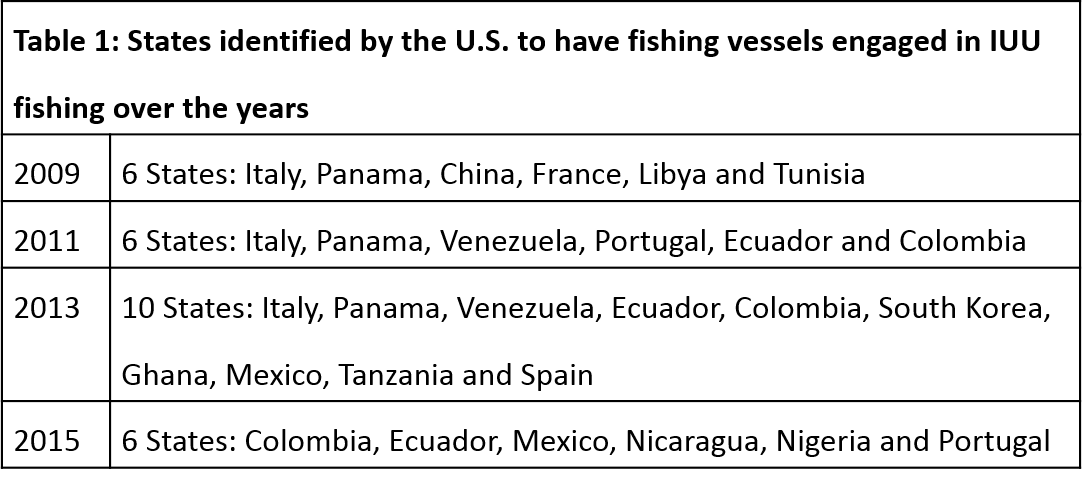
The Council of the European Union passed No.1005/2008 regulation to prevent, deter and eliminate IUU fishing in 2008. It regulates that flag States should issue the Catch Certificate to their catches exported to the E.U. Moreover, the E.U. should send specialists to all flag States and exporting countries to check the implementation of the regulation on flag States. If a State is found with failure to follow national obligations under international law, it can be identified as uncooperative to fight against IUU fishing. Those in the list of uncooperative States (red card) will be banned to export their catches into the E.U. Those in the warning list (yellow card) will be given with six months for improvement. So far the E.U. has cooperated with more than 30 States to combat IUU fishing. (Table 2)
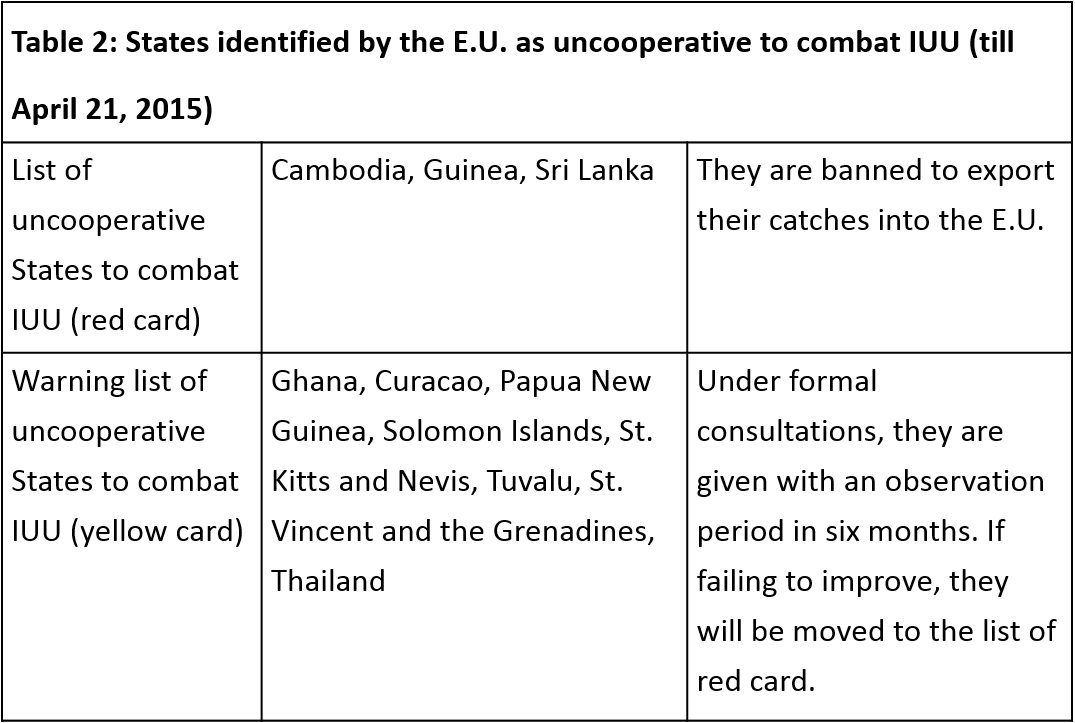
As one of the major fishing States in the world, Taiwan has been implementing relevant fisheries management measures for many years, actively participating in relevant regional fisheries management organizations and constantly consulting with the U.S., the E.U. and Japan. To cooperate with international fight against IUU fishing, Taiwan has recently promoted a series of measures to strengthen fisheries management, such as installation of e-logbook in fishing vessels, implementation of fish landing declaration mechanism, and designation of fish landing in foreign ports. These measures aim to strengthen the supervision and control over Taiwan’s fishing vessels, and to fulfill the responsibilities as a flag State to eliminate IUU fishing as well as prevent the circulation of IUU fishing catches through Taiwan’s fishing vessels. The objective is to jointly combat IUU fishing with the international community and to maintain the sustainable utilization of fishery resources.
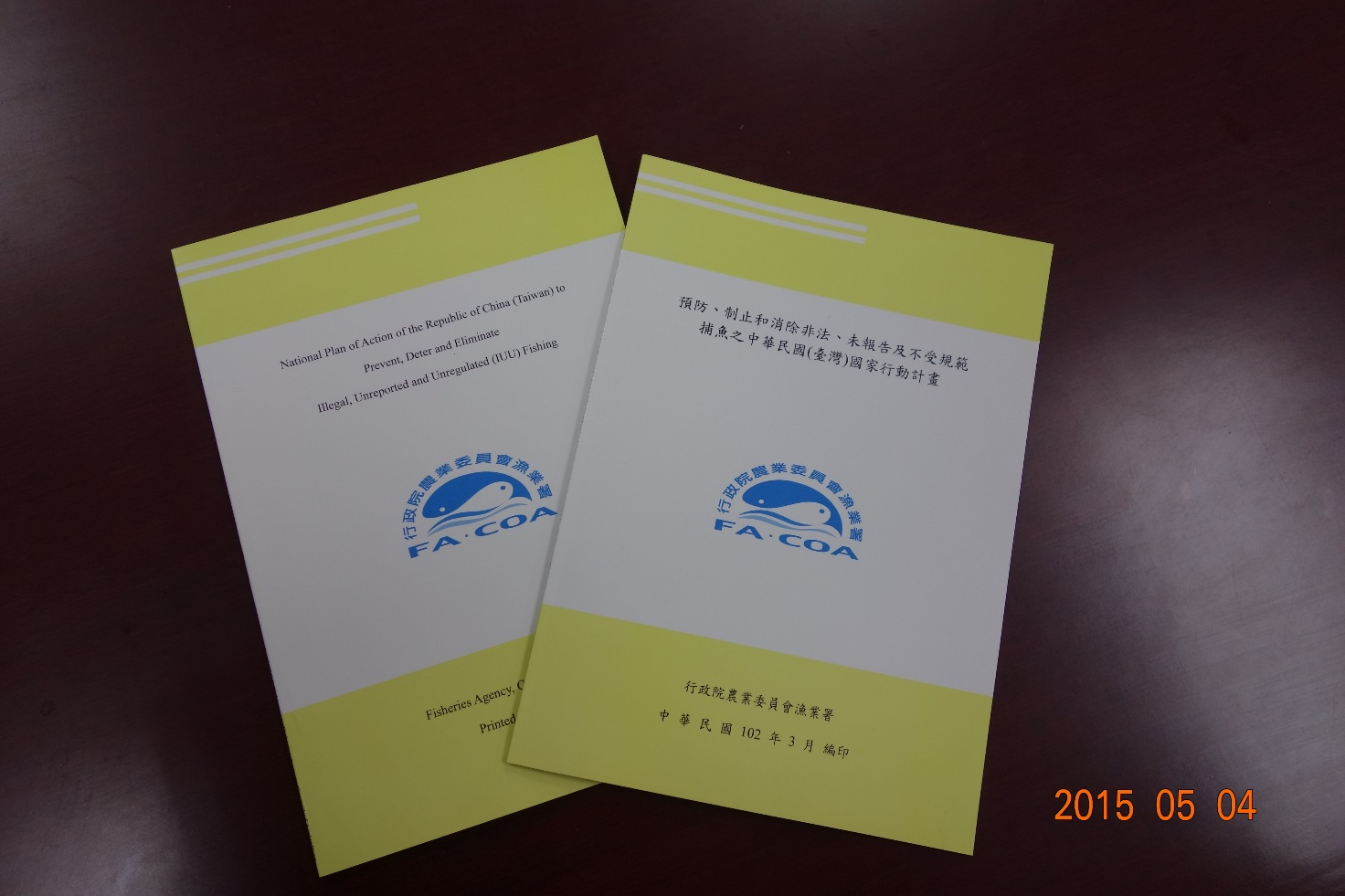
Chinese and English versions of National Plan of Republic of China to prevent, deter and eliminate Illegal, Unreported and Unregulated (IUU) fishing
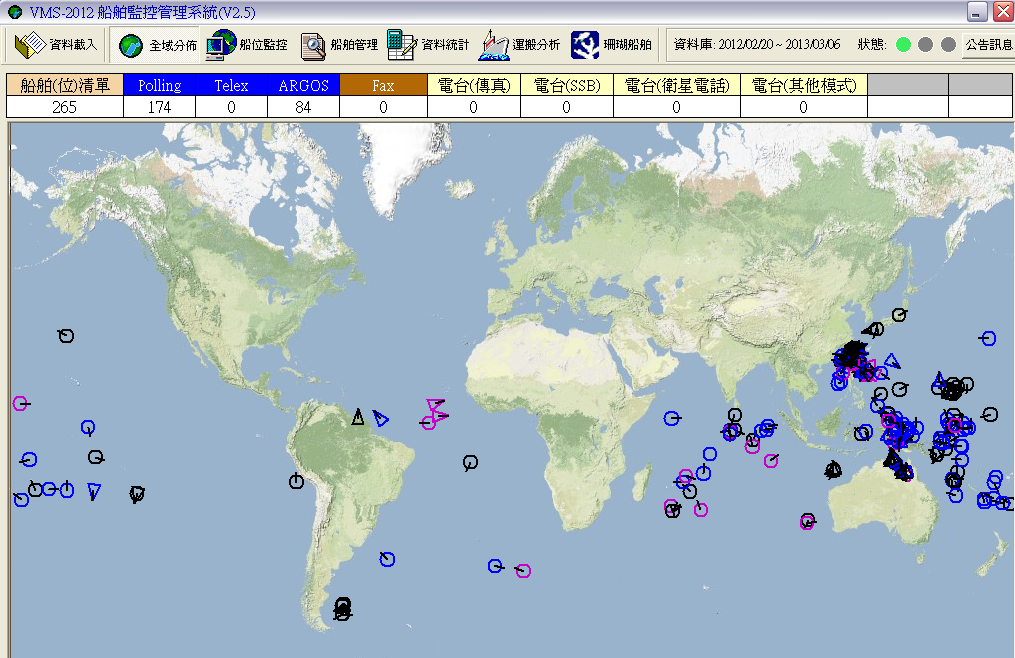
Taiwan’s Vessel Monitoring System (VMS)
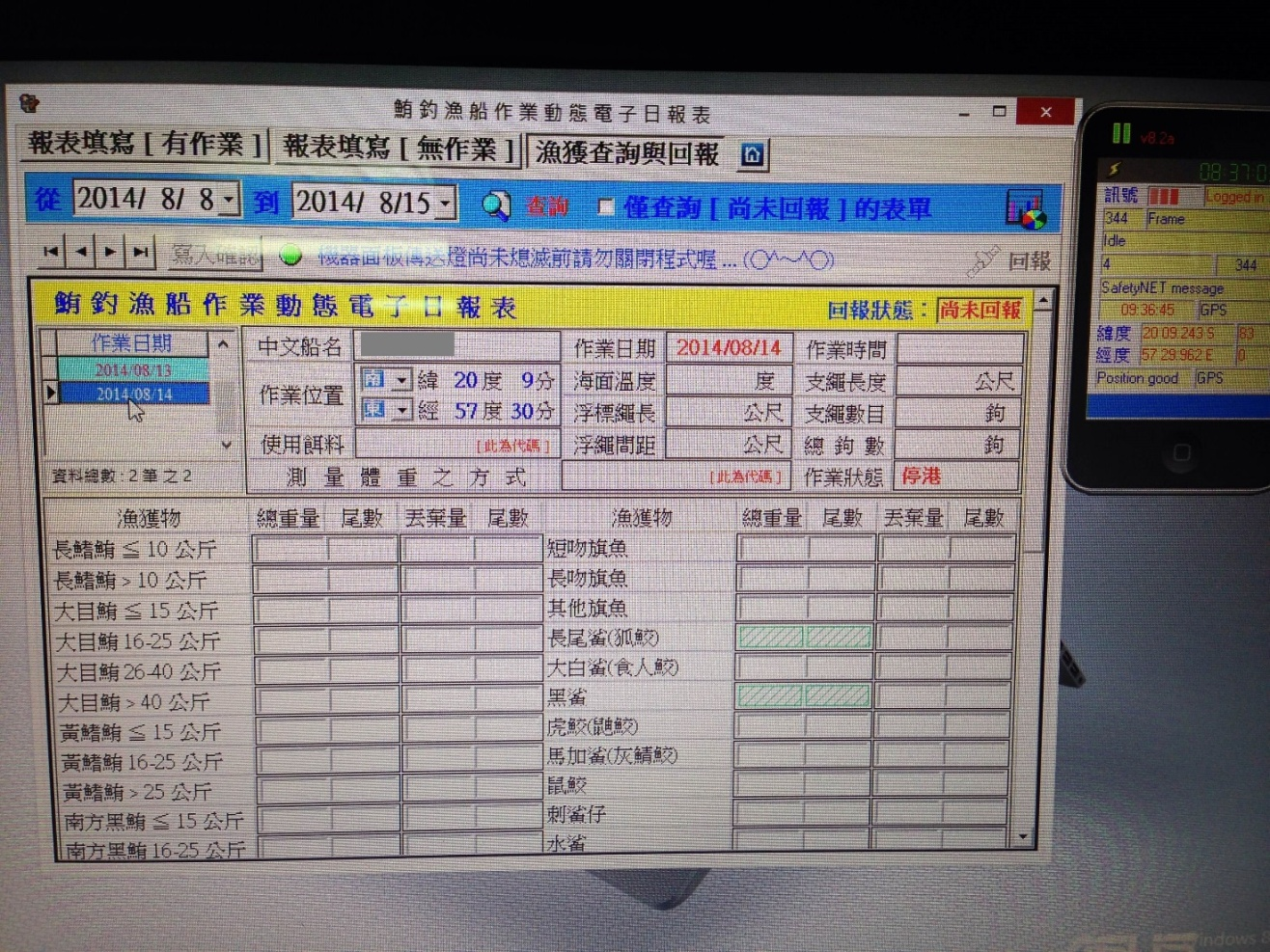
Taiwan’s e-logbook for tuna fishing vessels
